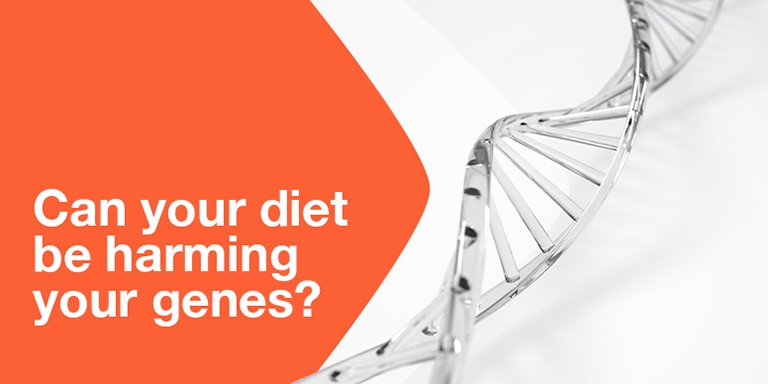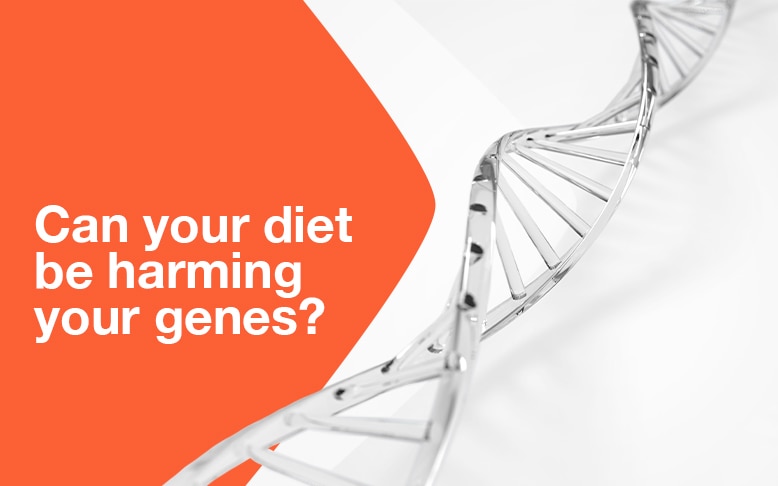A need for dietary strategies to combat chronic diseases
General dietary guidelines have been designed for the prevention of chronic diseases and optimizing health. However, cardiovascular diseases have remained a leading cause of mortality worldwide.
In recent years, science has revealed that there is no one-size-fits-all approach to diet. Researchers have explored the potential of nutrigenomics in preventing chronic diseases and improving human health.
In this article, learn what nutrigenomics is and how it can help you choose a diet that will best work for your body and help support a healthy heart.
Why no single diet fits all
Did you know that diet can affect our genes? Diet interacts with our genes and affects how they work. As we are all unique individuals, our genes interact with diets differently and so our responses to diet vary.
What is Nutritional Genomics?
Nutritional genomics, or nutrigenomics, is a science that studies the relationship between nutrition, genes, and health.
As the term nutritional genomics implies, 'nutritional' revolves around the foods we eat, while 'genomics' zooms in on the genome or genes of an individual. Nutritional genomics aims to know how nutrient-gene interactions can prevent disease and positively impact human health on an individual as well as on a population level.1
Nutritional genomics is the umbrella term that encompasses two opposing disciplines, namely: nutrigenomics and nutrigenetics.1
Nutrigenomics is being considered as a subset of epigenetics since nutrients can turn on and off certain genes. Diet has a certain role in turning on and off inflammatory pathways.4
Current research focuses on nutrigenomics, which uses cutting-edge "omics" technology to examine how the foods we eat can change how our genes are expressed (or how they function).
With nutrigenomics, more people are now becoming interested in learning how diet affects their genes, whether the foods they consume increase or decrease their chance of developing a disease.
How do nutrients and genes interact?
Primarily, there are three types of nutrient-gene interactions that occur:5
- Direct interactions: Nutrients, sometimes after interacting with a receptor, behave as transcription factors that can bind to DNA and acutely induce gene expression.
- Epigenetic interactions: Nutrients can alter the structure of DNA (or of histone proteins in chromatin) so that gene expression is chronically altered.
- Genetic variations: Common genetic variations such as single-nucleotide polymorphisms (SNPs) can alter the expression or functionality of genes.
All of these mechanisms can result in altered metabolism and altered dietary requirements for nutrients.
Why does nutrigenomics matter?
- Understanding the relationship between diet and genes can help us improve our health today and decrease our risk of chronic diseases.6
- With nutrigenomics, we could learn how our genes work and, through informed food choices, we can control the instructions we give to our bodies.7
- Also, knowledge on nutrigenomics will enable the nutritionist-dietitians to design and prescribe personalized diet plans based on each person's genetic makeup to optimize health.4
Nutrigenomics and heart health
The link between oxidative stress and inflammation with chronic diseases is already well-established. These metabolic conditions can damage the biological molecules in the body such as proteins and lipids and can cause abnormality in the cell signaling pathways leading to abnormal gene expressions.8
There are a lot of factors that can contribute to oxidative stress. Most of these factors are modifiable such as a poor diet with plenty of sweets and fats, and unhealthy lifestyle behaviors, such as lack of exercise, excessive alcohol drinking, smoking and high levels of stress.9 Oxidative stress can deplete the natural antioxidants in the body and turn on genes that promote inflammation, creating a vicious cycle of oxidative stress and inflammation.9
Since the primary objective of nutrigenomics is to avoid the onset and progression of chronic disease, studies are focused on discovering dietary components that can interact with genes which can help lower the risk of non-communicable diseases.10 Cardiovascular disease (CVD) is of a particular interest in nutrigenomics as it remains the leading cause of death worldwide. Studies have shown that high levels of unwanted substances in the body called free radicals lead to oxidative stress and inflammation which are the underlying causes of heart disease.10
Figure 1. Role of antioxidants in combating oxidative stress
Good nutrition provides a defense against oxidative stress and inflammation associated with chronic diseases like CVD.
Various nutrients and foods with antioxidant and anti-inflammatory properties have been shown to modulate these metabolic processes through their interactions with genes at the molecular levels.11, 12
What are some dietary factors that interact with genes to improve heart health?
The following are some of the dietary factors that have been shown to interact with genes that regulate inflammation and oxidative stress, supporting a healthy heart.
Conclusion
Nutrigenomics studies how nutrients in the diet and genes interact. This gene-diet interaction affects a person’s risk to certain health conditions like CVD. Several dietary factors have been proven to interact with genes and affect how they work. These dietary factors can turn on or off the activity of genes that control oxidative stress and inflammation, two conditions which are considered as the underlying causes of most chronic diseases like CVD.
Message to RNDs
While more research is needed to prove the application of nutrigenomics in clinical practice, it is still best to follow the tried-and-tested nutrition advice of placing a priority on a diversified diet of nutritious whole foods while keeping the intake of less healthy food items to a minimum.
Pro-Tip
Turn the good genes on with heart-healthy foods.


 Liezl M. Atienza , RND, PhD
Liezl M. Atienza , RND, PhD














No comments here yet.